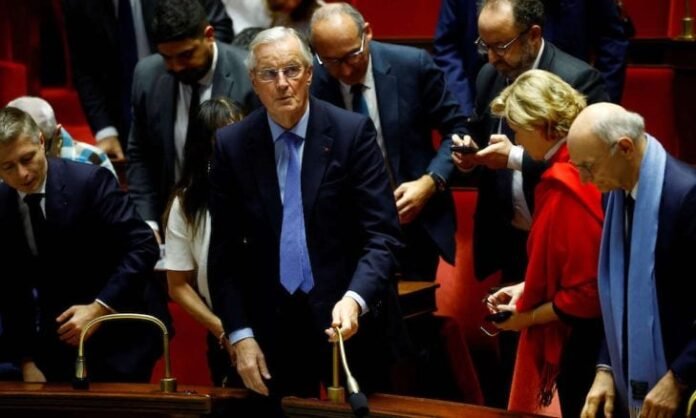In a historic move not seen in 62 years, the French Parliament decided to withdraw confidence from Prime Minister Michel Barnier’s government after a majority vote supported a no-confidence motion submitted by the “New Popular Front” coalition of left-wing parties, joined by MPs from the far-right “National Rally” party.
https://twitter.com/France24_ar/status/1864392428674793714
This vote followed Barnier’s invocation of Article 49.3 of the French Constitution, which allows the government to pass legislation without a parliamentary vote. This invocation was tied to the 2025 Social Security budget proposal, which faced rejection from various political blocs.
What are the real reasons behind invoking Article 49.3?
This event has raised many questions about the motives for invoking Article 49.3. Was this a strategic decision by Barnier, or was he forced into it due to France’s political divisions? The government found itself in a tough spot after early legislative elections resulted in a fragmented Parliament, making it difficult to pass laws through traditional means. Is this move an attempt to maintain governmental stability, or does it reveal the fragility of France’s political system?
🚨🇫🇷 URGENT – LA MOTION DE CENSURE EST ADOPTÉE : LE GOUVERNEMENT BARNIER TOMBE OFFICIELLEMENT. (LCP) pic.twitter.com/xFHMF9zh7d
— AlertesInfos (@AlertesInfos) December 4, 2024
Economic and Political Implications in the Long Run
As France grapples with a significant budget deficit, the vote raises concerns about its impact on the country’s economic situation and its relations with the European Union. Will this no-confidence vote lead to further financial complications amidst mounting economic pressures? What will be the implications for the economic direction and financial reforms that France urgently needs? The vote is expected to have a profound impact on the French government’s ability to meet its European obligations amid a global economic crisis.
Trust Crisis and Macron’s Challenges
Meanwhile, President Emmanuel Macron is under immense pressure in these circumstances. As he prepares to meet US President Donald Trump during an official visit to Paris, Macron finds himself in a highly precarious position. Unwilling to appear before the American president without a stable government, Macron is moving quickly to nominate a successor to Barnier. What will Macron’s strategy be in selecting a new Prime Minister? Will he opt for someone capable of restoring internal political stability, or will he seek a political solution to balance the various factions in the French Parliament?
Who Will Inherit the Prime Minister’s Office?
In this volatile political climate, several names are being floated as potential successors to Michel Barnier. Sébastien Lecornu, Minister of the Armed Forces, is a frontrunner due to his close ties with Macron. But will his appointment guarantee stability, or will the current crisis necessitate a different choice? François Bayrou, leader of the “Union for French Democracy” party and a key Macron ally, is also among the contenders. What would the choice of either candidate signify in this tense political context?
Are France-EU Relations at Risk?
The implications of this vote for France’s relationship with the European Union are pivotal. Will this development undermine France’s ability to fulfill its financial and political commitments within the EU? At a critical time when other European governments, such as Germany, are dealing with internal crises, could France face increased political isolation as a result of this vote?
Conclusion: At a Political Crossroads
Ultimately, France finds itself at a crucial political crossroads. The selection of a new Prime Minister will have significant consequences for government stability, parliamentary relations, and the country’s economic direction and necessary reforms. Can Macron find the right balance during this sensitive period? What will this decision mean for France’s political and economic future?
This historic shift in French politics reflects a state of political and economic uncertainty that could have far-reaching consequences in the long term.


